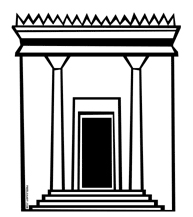Do Jews, Christians, & Muslims worship the same God?
Judaism, Christianity, and Islam are monotheistic religions (they believe in one God). Jews, Christians, and Muslims all believe that they worship the God of Abraham. So, does that mean they worship the same God? Not necessarily.
Jews and Christians believe in “Jehovah” God as described in the Torah and Old Testament. In addition, Christians believe in a Jewish Jesus Christ as the Messiah and Son of God as described in the New Testament. Jews do not accept Jesus Christ as their Messiah but they are eagerly awaiting a Jewish Messiah. Jews and Christians both worship the same God of Abraham: Jehovah.
Islam arrived about 600 years after Jesus Christ. Muslims worship a god called “Allah” whom they believe to be the God of Abraham. But the Koran’s and the Hadith’s descriptions of Allah do NOT resemble the Torah’s or the Holy Bible’s description of Jehovah.
In addition to differences in character, Allah and Jehovah differ in other ways. The Torah and the Holy Bible say that Jehovah loves the Jewish people and refers to them as his “chosen” people. The Koran says that Allah hates the Jewish people and tells the Muslims to kill all the Jews. Allah and Jehovah are the exact opposite of each other, therefore they cannot both be the God of Abraham.
The God of Abraham
Muslims, Jews, and Christians all believe that they are worshiping the God of Abraham. But the teachings of Muhammad are the opposite of the teachings of Jesus Christ. Islam is the antithesis of Christianity. It is impossible for both to be worshiping the One true God.
A Foreign God – A God of War – A God Unknown to His Ancestors
When Muhammad received revelations from an angel, he believed that he was chosen to re-establish the original religion of his ancestors (Adam, Abraham). He intentionally rejected the God of Abraham that was being worshiped by the Jewish people. He began to proclaim a new monotheistic religion that was dedicated to serving “Allah” – whom Muhammad adamantly declared to be the God of Abraham.
37 He will show no regard for the gods of his ancestors … 38 Instead of them, he will honor a god of fortresses; a god unknown to his ancestors … 39 He will attack the mightiest fortresses with the help of a foreign god and will greatly honor those who acknowledge him. He will make them rulers over many people and will distribute the land at a price. (Daniel 11: 37-39)
Is it possible that Muhammad was deceived into believing in a “foreign god”? It is possible that this was “a god of fortresses” (a god of war) and “a god unknown to his ancestors”? Who is this “Allah”?
The Names of Allah
Islam teaches that there are 99 names for Allah. Some of the names for Allah are similar to the names of God that are found in the Holy Bible. However, some of the other names for Allah are very different from the character of Jehovah God. The following examples are from the Koran:
Al-Mutakabbir = The Most Proud One (Surah 59:23)
Al-Khāfiḍ = The Abaser, The Humiliator, The Downgrader (Surah 56:3)
Al-Mumīt = The Bringer of Death (Surah 3:156, 7:158, 15:23, 57:2)
Al-Qahhār = The Subduer (Surah 12:39, 13:16, 14:48, 38:65, 39:4, 40:16)
Aḍ-Ḍārr = The Distressor, The Harmer, The Afflicter (Surah 6:17)
Al-Makireen = The Best Deceiver, The Best Schemer, The Best Conniver (Surah 3:54, 8:30)
The Holy Bible describes the evil one (Satan) in the following ways:
The Proud One (Isaiah 14: 12-15)
The Accuser (Revelation 12: 10)
The Deceiver (Genesis 3: 13) (2 John 1: 7) (Acts 13: 10) (2 Corinthians 11: 14-15)
The Schemer (Ephesians 6: 11-12)
The Father of Lies (John 8: 44)
The One Who Exalts Himself Above God (Isaiah 14: 12-15)
The One Who Wars Against God (Revelation 12: 7-9)
The One Who Hates & Afflicts Jews (Revelation 12: 13-16)
The One Who Hates & Afflicts Christians (Revelation 12: 17)
The One Who Uses Anger to Control Humans (Ephesians 4: 26-27)
The One Who Will Give His Power to the Beast (Revelation 13: 4-7)
If one is worshiping the God of Abraham, who is the other worshiping?
Who is the opposite of God, uses deceit, and desires to be worshiped?



Leave a Reply